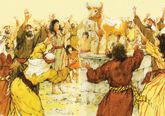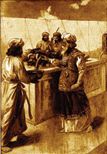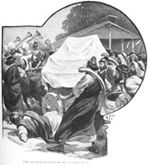×


We have detected your country as:
Please click here to go to the USA website or select another country from the dropdown list.
by: Charleeda Sprinkle, Assistant Editor

At a Bridges for Peace staff devotion, we were inspired by a dynamic God-Tube video about the 1992 British Olympic runner, Derek Redmond. Although Redmond had undergone eight surgeries prior to the games, he made the fastest time for the first round of the 400–meter race and also won the quarter–final. However, in the semi–final, his hamstring suddenly snapped, and he fell to the ground in excruciating pain. A stretcher was brought out to the track, and his father ran down from the stands to assist him. But instead of quitting, Redmond chose to finish the race and hobbled down the track holding on to his dad for support to the end. The entire stadium of 65,000 rose for a standing ovation. Though he didn’t win the prize he was after, he certainly taught thousands of people a lesson in endurance.
I think the Apostle Paul would have enjoyed this story because he wrote about running a race more than once: “Do you not know that those who run in a race all run, but one receives the prize? Run in such a way that you may obtain it” (1 Cor. 9:24). Paul continues in chapter 10, using the wilderness as the great “race track” on which the Children of Israel ran. How well did they run their race? “…with most of them God was not well pleased, for their bodies were scattered in the wilderness” (10:5). Twice he writes that their wilderness experiences are “examples” for us: “Now all these things happened to them as examples, and they were written for our admonition…” (v. 11).
To admonish, according to Webster’s, is to caution, rebuke, counsel, advise, reprove, forewarn, or warn. In both Greek and Hebrew, its use ranges in severity from just refreshing one’s memory as in instruction to corporal punishment as in child-rearing or God’s chastisement of His people. The Hebrew equivalent,yasar, can mean “to correct by blows or stripes.” How is it used here? Probably within that whole range, as Paul is warning us not to make the same mistakes, but at the same time, the examples he chose are ones in which God used drastic measures in bringing correction to the Israelites. Barnes’ Notes comments that Paul is reminding the Corinthians “that their privileges [as believers] did not constitute an absolute security from danger, and that they should be cautious against the indulgence of sin.”
Of all the stories Paul could have used from the Tanach (Old Testament), why did he choose the wilderness stories for instructing Gentiles newly converted from paganism to the way of God? The Gentiles were not familiar with the Hebrew Scriptures, but the Jewish people all knew the Exodus story well; it was the story of their nation’s founding. It was so important to God that He established the Feast of Passover and had them rehearse it every year for a whole week (Exod. 12). He also instituted the annual, week-long Feast of Tabernacles, when they were to remember how God took care of them for 40 years in the wilderness (Lev. 23:33–43). In Deuteronomy 5:12–15, instructions for the weekly Sabbath include a remembrance of their redemption from Egypt.
So, if the wilderness event was important enough for God to remind His people of it so often, and Paul uses it as instruction for new God-followers, its lessons are probably some of the most important we can learn. Paul chooses only five examples—probably because they were the ones the Corinthians were struggling with the most—but there are many others. If we study them well, it will help keep us from stumbling like they did. Jewish people study Exodus through Deuteronomy (and Genesis) throughout the year, every year, which wouldn’t be a bad exercise for us as well. And to those who might think they don’t need these lessons, Paul says,“let him who thinks he stands take heed lest he fall” (1 Cor. 10:12).
“Now these things became our examples, to the intent that we should not lust after evil things as they also lusted” (v. 6). To lust means to desire, covet, wait longingly, sigh, or be greedy. Psalm 106:14 tells us that the Israelites “lusted exceedingly in the wilderness, and tested God in the desert.” What did they lust for? They remembered the “good life” they left behind (forgetting the cruel slavery): pots of meat, “bread to the full” (Exod. 16:3), “fish which we ate freely in Egypt, the cucumbers, the melons, the leeks, the onions, and the garlic” (Num. 11:5).
Desiring good food was not evil, but the spirit of discontent behind it was. They lusted “after what God withheld and were discontented with what God provided,” write Jamieson, Fausset & Brown (JFB). Before they could finish eating the first quail God gave them, a great plague broke out, and those “who yielded to craving” (Num. 11:34) were buried at Kibroth Hattaavah (“the grave of lust”). God’s “anger was aroused” (v. 1) because after all He had done to free them from 400 years of slavery, all they could think about was the good food they’d left behind. The lust of the flesh had clouded their memory. Lust is motivated purely by the desire or need of the moment and doesn’t take stock of the big picture or long-term consequences.
JFB note that Paul listed it first because it’s the “fountain of all other offenses enumerated” (see James 1:14–15). The apostles often gave strong warnings against lust (Gal. 5:16–21; James 4:2; 1 John 2:16). We lust when we are not thankful, which means we are accusing God of not providing sufficiently for us. Paul didn’t just preach this lesson; he lived it. “…I have learned in whatever state I am, to be content: I know how to be abased, and I know how to abound. Everywhere and in all things I have learned both to be full and to be hungry, both to abound and to suffer need” (Phil. 4:11–12). Earlier in this passage, Paul tells us we can bring our needs and desires before God, but “with thanksgiving” (v. 6) and to make it a practice to think on the good things rather than the bad (v. 8).

“And do not become idolaters as were some of them” (1 Cor 10:7). Paul is probably referring to the golden calf incident in Exodus 32, though they also “bowed down” to the Moabite gods later in their journey (Num. 25). Because they worshipped the golden calf, 3,000 were killed. Generations later, the kingdom of Judah was exiled from the Land of Israel for 70 years chiefly because of idol worship. But after the exile, we don’t see this sin plaguing Israel again. It took an extreme measure to purge them of this.
Idolatry occurs when God is replaced by another love in our lives, when we break the first commandment:“You shall have no other gods before Me” (Exod. 20:3), when God is no longer our first love (Rev. 2:4), or when we don’t love the Lord with all our heart, soul, and strength (Deut. 6:5). Nothing is to come before Him because He demands first place. Yeshua (Jesus) explained the first commandment in very specific terms: “He who loves father or mother more than Me is not worthy of Me. And he who loves son or daughter more than Me is not worthy of Me” (Matt. 10:37).

The Lord told John G. Lake to sell everything he had and give it away.
I would venture to say that every Christian volunteer in Israel has struggled with these verses. All of us have left family and some have sold property and other belongings to come. John G. Lake, who had an amazing healing ministry in the early 20th century, was ordained as a Methodist minister at age 21, but chose instead to enter the business world where he became very successful. However, after his wife received a miraculous healing, he returned to the ministry, but not without a cost. The Lord told him to sell everything he had and give it away. Some of God’s servants have even left young children behind when following the Lord’s call to a foreign land, and many who have been persecuted for their faith have watched their children be tortured or killed.
How easy it is to let something or someone else become number one! We must constantly check the other “loves” of our lives and make sure they have not slipped into that sacred position.

The Ark of the Covenant
“Nor let us commit sexual immorality, as some of them did, and in one day twenty-three thousand fell” (1 Cor 10:8). Paul is specifically referring to the incident in Numbers 25:1–9 when the Israelites not only sacrificed to Moabite gods but committed “harlotry with the women of Moab.” God’s instructions were to “take all the leaders of the people and hang the offenders before the LORD, out in the sun, that the fierce anger of the Lord may turn away from Israel” (v. 4). Then Moses instructed the judges of Israel to kill everyone who had participated. The outcome was grievous number-wise, but this was not the first time they fell into immorality.
When the Israelites worshipped the golden calf, they also “rose up to play” (Exod. 32:6). Before Moses descended from Mount Sinai with the Ten Commandments, God informed Moses that the people had “corrupted themselves” (v. 7). In Hebrew, it means to be marred, spoiled, ruined, or rotted. The strongest sense of the word means to be destroyed. This word is used in the story of the flood: “for all flesh had corrupted their way on the earth” (Gen. 6:12). Man was so “ruined,” God had to destroy them. The word is also used in reference to idolatry. Sexual immorality ruins God’s highest purpose for us—holiness. “Therefore…be sober…as obedient children, not confirming yourselves to the former lusts…but as He who called you is holy, you also be holy in all your conduct because it is written, ‘Be holy, for I am holy’” (1 Pet. 1:13–16, quoting Lev. 11:44).

Possibly the best way to understand holiness is from tabernacle/ temple worship. All tabernacle/ temple furnishings, priests, and sacrifices were sanctified or set apart for God and thus made holy. The vessels could not be used for any other purpose. Priests could not serve if they became unclean. Even the animals used for sacrifices had to be unblemished. Anything or anyone defiled was unusable and unacceptable, and any corruption was dealt with severely. When Aaron’s sons used “strange fire,” they died (Lev. 10). When Eli’s sons, also priests, were guilty of sexual immorality, they were slain in battle (1 Sam. 3–4). When oxen carrying the Ark of the Covenant stumbled and Uzza reached up to steady it, he died (1 Chron. 13).

Uzza died for trying to steady the Ark.
Earlier in this letter, Paul reminds the Corinthians: “Do you not know that you are the temple of God and that the Spirit of God dwells in you? If anyone defiles the temple of God, God will destroy him. For the temple of God is holy, which temple you are” (1 Cor. 3:16–17). Strong words! It’s possible that his reference to God’s destruction could mean an early death. When Paul found out that there was sexual immorality in the Corinthian church, he told them to “deliver such a one to Satan for the destruction of the flesh, that his spirit may be saved…” (1 Cor. 5:5). Though I’m not going to try to interpret this, nonetheless, the language is very strong. At the very least, it meant excommunication from the church, for Paul says “Do you not know that a little leaven leavens the whole lump?” (v. 6). He knew that, if ignored, this one incident could corrupt the whole body.
My own family has experienced the devastating damage that comes from this sin, so I can’t help but be more passionate about this. I plead with anyone reading this who struggles with it to humble yourself and run for counsel. You cannot conquer this on your own. Don’t be deceived: what has been defiled cannot be used by God. You may be successful in keeping your sin hidden and continue to serve God (even as a minister), but your offering will not be acceptable. However, you can be cleansed and restored through loving correction and repentance (2 Cor. 2). Don’t let pride keep you bound to this.
The consequences today may not seem as dramatic or harsh as in the days of Moses, but Paul warns the Corinthians: “Do you not know that the unrighteous will not inherit the kingdom of God? Do not be deceived. Neither fornicators, nor idolaters, nor adulterers, nor homosexuals, nor sodomites, nor thieves, nor covetous, nor drunkards, nor revilers, nor extortioners will inherit the kingdom of God” (1 Cor. 6:9–10). This is the consequence if our sin becomes a lifestyle, and such a lifestyle has the potential to even lead to apostasy, a complete turning from the truth once confessed, which Hebrews 10:26–31 cautions against. These dangers are precisely why we are admonished to“consider one another in order to stir up love and good works, not forsaking the assembling of ourselves together…but exhorting one another” (Heb. 10:24–25). We need each other’s correction and encouragement to keep us on track.

“Nor let us tempt Christ, as some of them also tempted, and were destroyed by serpents” (1 Cor 10:9). This can be a difficult verse to understand. First, according to Barnes’ Notes, Paul is probably not referring to Yeshua here, as He did not walk the earth at the time of this incident. “Christ” is not Yeshua’s last name, as in “Jesus Christ.” It is a title meaning Messiah. It is possible that Paul is referring to the Angel of the Lord that went before the Children of Israel (as in Exod. 32:34), who many Christian commentators and teachers believe was the pre-incarnate Yeshua.
Second, neither God nor His Messiah can be tempted as men are tempted to sin. Rather the meaning of the word “tempt” here, as Barnes’ explains, means “to try His patience, to provoke His anger, or to act in such a way as to see how much He will bear and how long He will endure the wickedness and perverseness of people.” Christian commentator William Barclay writes, “There is a temptation to try God too far. Consciously or unconsciously many a man trades on the mercy of God. At the back of his mind there is the idea, ‘It will be all right; God will forgive.’ It is at his peril that he forgets that there is a holiness as well as a love of God.”
Paul is referring to the story in Numbers 21:4–9, when in the 40th year of their journey, “the people spoke against God and against Moses: ‘Why have you brought us up out of Egypt to die in the wilderness? For there is no food and no water, and our soul loathes this worthless bread.’ So the LORD sent fiery serpents among the people, and they bit the people; and many of the people of Israel died.”After 40 years, it seems their attitude had changed little. To tempt God is to bring Him to a point that He has to act because we have not taken advantage of the time of grace given for us to change but have instead continued to sin.
We don’t know how the Corinthians might have been doing this, but Barnes’conjectures: “It may be that the apostle cautions them against exposing themselves to temptation in the idol temples—placing themselves, as it were, under the unhappy influence of idolatry, and thus needlessly trying the strength of their religion, and making an experiment on the grace of Christ, as if he were bound to keep them even in the midst of dangers into which they needlessly ran.”
A modern-day application might be if someone who had been delivered of alcoholism started hanging out at a bar. In other words, we need to apply wisdom in those areas where we know we are vulnerable. Yes, God can and will protect and deliver us in circumstances we fall into outside our control, but we should use all caution in not doing what we know will lead to temptation.
![]()
“Nor complain, as some of them also complained, and were destroyed by the destroyer” (1 Cor 10:10). As we’ve already pointed out, the Israelites complained because there was no water, no bread, and no meat. They also complained against leadership. Miriam was struck with leprosy for speaking against Moses (Num. 12). When the Israelites chose not to enter the Promised Land for fear of its “giants,” they complained against Moses and Aaron and said, “Let us select a leader and return to Egypt” (Num. 14:4). But God took it as a complaint against Himself: “How long shall I bear with this evil congregation who complain against Me?” (v. 27). He told them, “The carcasses of you who have complained against Me shall fall in this wilderness…” (v. 29), and in the end, Caleb and Joshua would be the only ones in that generation to enter the Promised Land. When Korah led 250 other leaders against Moses and Aaron, the ground opened up and swallowed them, but they blamed Moses and Aaron saying, “You have killed the people of the LORD” (Num 16:41). At once, God struck them with a plague that killed 14,700 before Aaron interceded.
We should remember these examples when we complain against leadership, whether in the church, the work place, or the government. Shortly after the 2008 elections in America, many harsh derogatory remarks were made about President-elect Barack Obama. When it would have been easy to join in, I felt the Lord admonish me that we were not to do that. We are to let all “evil speaking be put away” (Eph. 4:31). Paul makes it clear that we are to be submissive to the authorities in our lives (Eph. 5) and to pray for them (1 Tim. 2:1–4).
He also states quite plainly, “Do all things without complaining and disputing, that you may become blameless and harmless, children of God without fault in the midst of a crooked and perverse generation, among whom you shine as lights in the world” (Phil. 2:14–15). Let us repent regularly when we notice a complaining spirit taking control of us, even if it’s only in our thoughts and we never say a word out loud.

This is not just an individual race we run. Every generation runs a lap and passes the baton on to the next until Messiah comes and, as the Christian Scriptures state, claims His bride, “holy and without blemish” (Eph. 5:27). Those who have gone before us are watching from the grandstands of heaven, eager to see us finish what they began. “…since we are surrounded by so great a cloud of witnesses [all the faithful listed in Hebrews 11], let us lay aside every weight, and the sin which so easily ensnares us, and let us run with endurance the race that is set before us” (Heb. 12:1).
Pastor Gary DeLashmutt writes about a race he participated in: “…when I ran the Columbus Half-Marathon, I saw some bizarre behavior at the starting line. It was cold, and most runners had on extra shirts or even old jackets as they waited to start. But in the last 30 seconds, thousands of runners (including myself) stripped off every shirt but the one with their race number—and threw them on to the street. Everyone got as light as possible—because it’s a long race and you don’t want to carry any more weight than you have to carry! One thing I did not see—I did not see anyone picking up suitcases!”
What unnecessary weights are you carrying that are slowing you down? Let’s strip ourselves of them, so we can make it to the finish line and hear the Lord say, “Well done!”
Photo Credit: www.israelimages.com
Photo Credit: en.wikipedia.org
Barclay, William. The Letters to the Corinthians: The Daily Study Bible Series. Philadelphia, PA: The Westminster Press, 1956.
Barnes’ Notes. Electronic Database, PC Study Bible, version 3. Copyright 1997 by Biblesoft.
DeLashmutt, Gary. “Hebrews 12:1, Running the Race with Endurance (Part 1).” http://www.xenos.org
Jamieson, Robert; A.R. Fausset; and David Brown. Commentary on 1 Corinthians 10. http://www.blueletterbible.org
Lake, John G. John G. Lake: His Life, His Sermons, His Boldness of Faith. Ft. Worth, TX: Kenneth Copeland Publications, 1994.
Wikipedia, “Derek Redmond.” http://www.en.wikipedi.org
All logos and trademarks in this site are property of their respective owner. All other materials are property of Bridges for Peace. Copyright © 2024.
Website Site Design by J-Town Internet Services Ltd. - Based in Jerusalem and Serving the World.